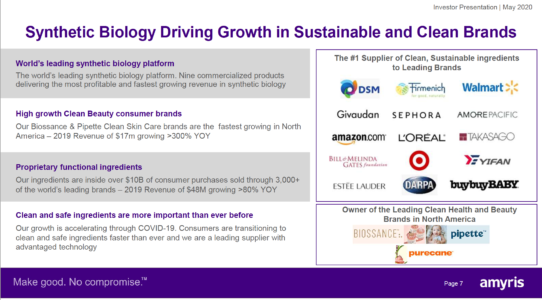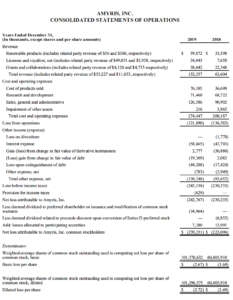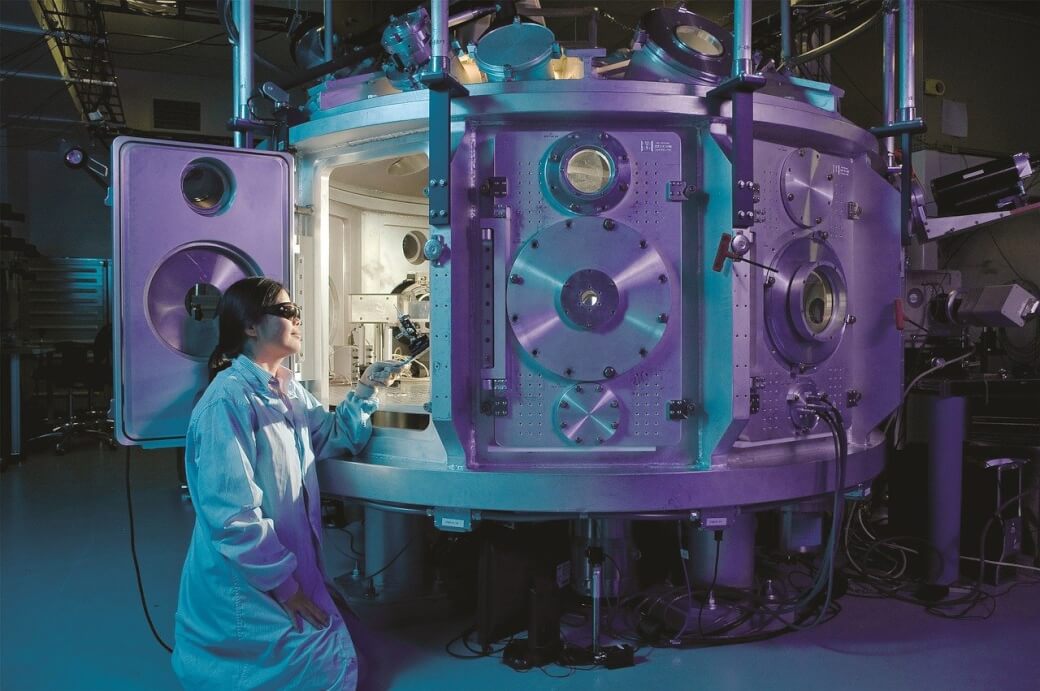Amyris, Inc is unique in many ways, but a synthetic biology company with a fifteen year history makes it a rare entity in a new, formative-stage industry.
In 2005, Amyris partnered with the Bill & Melinda Gates Foundation to engineer yeast to make artemisinic acid, a precursor of artemisinin, an effective anti-malarial drug. In 2008, Amyris licensed an artemisinic acid yeast strain to Sanofi on a royalty-free basis via OneWorld Health, resulting in the delivery of millions of treatments to those in need. Through continued support of the Gates Foundation, the company has sustained an ongoing effort to reduce the cost of ACT treatments by making yeast strains that produce artemisininic acid at an even lower cost.
Building on its success with artemisinic acid, in 2007 the company began applying its technology platform to develop, manufacture and sell sustainable alternatives to a broad range of markets. It focused initial development efforts primarily on the production of Biofene®, its brand of renewable farnesene, a long-chain, branched hydrocarbon molecule that is manufactured through fermentation using engineered microbes. The commercialization of farnesene pushed Amyris to create a more cost efficient, faster and accurate development process in the lab and to drive manufacturing costs down. This investment has enabled its technology platform to rapidly develop microbial strains and commercialize target molecules.

Today, the company applies its technology platform to engineer, manufacture and sell high performance, natural, sustainably sourced products into the Clean Health & Beauty and Flavor & Fragrance markets. Its technology platform enables it to rapidly engineer microbes and use them as catalysts to metabolize renewable, plant-sourced sugars into large volume, high-value ingredients.
The Amyris platform, combined with a proprietary fermentation process, replaces existing complex and expensive manufacturing processes. The company has used its technology to develop and produce nine distinct molecules at commercial volumes, leading to more than 17 commercial ingredients used by thousands of leading global brands.
According to Amyris, synthetic biology represents a third industrial revolution, bringing together biology and engineering to generate new, more sustainable materials to meet the growing global demand for bio-based replacements for petroleum-based and traditional animal- or plant-derived ingredients.
The company’s strategy is to build demand for its current portfolio of products through an extensive sales network provided by its collaboration partners that represent leading companies for our target market sectors. The company also has a small group of direct sales and distributors who support its Clean Beauty market and proprietary sweetener product, purecane.
Co-investments in the development of each molecule bring products from the lab to commercial-scale, and the company use its partners’ extensive sales force to sell Amyris ingredients and formulations to their customers as part of their core business. Amyris captures long-term revenue both through the production and sale of the molecule to its partners and through royalty revenues from our partners’ product sales to their customers.

In 2014, the company began manufacturing additional molecules for the Flavor & Fragrance industry, and in 2015 it began investing to expand its capabilities to other small molecule chemical classes beyond terpenes via a collaboration with the Defense Advanced Research Projects Agency (DARPA). And in 2016 Amyris expanded into proteins.
The company has invested over $700 million in infrastructure and technology to create microbes that produce molecules from sugar or other feedstocks at commercial scale. This platform has been used to design, build, optimize and upscale strains producing nine distinct molecules at commercial volumes, leading to more than 17 commercial ingredients used by thousands of leading global brands. Amyris’ time to market for molecules has decreased from seven years to less than a year for its most recent molecule, mainly due to its ability to leverage its technology platform.
Amyris’ technology platform has been in active use since 2007 and has been integrated with its commercial production since 2011, creating an organism development process that it believes makes it an industry leader in the successful scale-up and commercialization of biotech-produced ingredients.
The key performance characteristics of the company’s differentiated platform includes: proprietary computational tools, strain construction tools, screening and analytics tools, and advanced lab automation and data integration. Having this fully integrated with its large-scale manufacturing process and capability enables it to engineer with the end specification and requirements guiding its technology.
Amyris’ state-of-the-art infrastructure includes industry-leading strain engineering and lab automation located in Emeryville, California, pilot-scale production facilities in Emeryville, California and Campinas, Brazil, a demonstration-scale facility in Campinas, Brazil and a commercial-scale production facility in Leland, North Carolina (which is owned and operated by a joint venture with Aprinnova) to convert its Biofene into squalane and other final products.
The company is able to use a wide variety of feedstocks for production, but it has focused on accessing Brazilian sugarcane for its large-scale production because of its renewability, low cost and relative price stability. Other feedstocks include sugar beets, corn dextrose, sweet sorghum and cellulosic sugars at various manufacturing facilities.

Several years ago, Amyris made the strategic decision to transition its business model from collaborating and commercializing molecules in low margin commodity markets to higher margin specialty markets. It began the transition by first commercializing and supplying farnesene-derived squalane as a cosmetic ingredient sold to formulators and distributors. It also entered into collaboration and supply agreements for the development and commercialization of molecules within the Flavor & Fragrance and Clean Beauty markets where it used its strain generation technology to develop molecules that meet customer specs.
During this transition, Amyris solidified its business model of partnering with itscustomers to create sustainable, high performing, low-cost molecules that replace an ingredient in their supply chain, commercially scale and manufacture those molecules, and share in the profits earned by its customers once the customer sells its product into these specialty markets. These three steps constitute its grants and collaborations revenues, renewable product revenues, and royalty revenues.
Source: Amyris, Inc
The ideas presented on this site do not constitute a recommendation to buy or sell any security. Investors are advised to conduct their own independent research into individual stocks before making a purchase decision. In addition, investors are advised that past stock performance is not indicative of future price action. You should be aware of the risks involved in stock investing, and you use the material contained herein at your own risk. Neither SYNTHETIC.COM nor any of its contributors are responsible for any errors or omissions which may have occurred. The analysis, ratings, and/or recommendations made on this site do not provide, imply, or otherwise constitute a guarantee of performance. SYNTHETIC.COM posts may contain financial reports and economic analysis that embody a unique view of trends and opportunities. Accuracy and completeness cannot be guaranteed. Investors should be aware of the risks involved in stock investments and the possibility of financial loss. It should not be assumed that future results will be profitable or will equal past performance, real, indicated or implied. The material on this website is provided for information purpose only. SYNTHETIC.COM does not accept liability for your use of the website. The website is provided on an “as is” and “as available” basis, without any representations, warranties or conditions of any kind.

